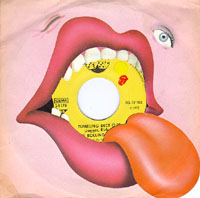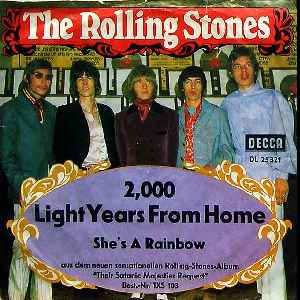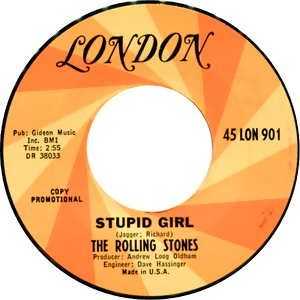Related Research Articles

The Rolling Stones are an English rock band formed in London in 1962. Active for over six decades, they are one of the most popular and enduring bands of the rock era. In the early 1960s, the band pioneered the gritty, rhythmically driven sound that came to define hard rock. Their first stable line-up consisted of vocalist Mick Jagger, guitarist Keith Richards, multi-instrumentalist Brian Jones, bassist Bill Wyman, and drummer Charlie Watts. During their early years, Jones was the primary leader. Andrew Loog Oldham became their manager in 1963 and encouraged them to write their own songs. The Jagger–Richards partnership soon became the band's primary songwriting and creative force.

Exile on Main St. is the tenth studio album by the English rock band the Rolling Stones, released on 12 May 1972, by Rolling Stones Records. The 10th released in the UK and 12th in the US, it is viewed as a culmination of a string of the band's most critically successful albums, following Beggars Banquet (1968), Let It Bleed (1969) and Sticky Fingers (1971). Exile on Main St. is known for its murky, inconsistent sound due to more disjointed musicianship and production, along with a party-like atmosphere heard in several tracks.

Aftermath is the fourth studio album by the English rock band the Rolling Stones. The group recorded the album at RCA Studios in California in December 1965 and March 1966, during breaks between their international tours. It was released in the United Kingdom on 15 April 1966 by Decca Records and in the United States in late June or early July 1966 by London Records. It is the band's fourth British and sixth American studio album, and closely follows a series of international hit singles that helped bring the Stones newfound wealth and fame rivalling that of their contemporaries the Beatles.
"The Song Remains the Same" is a song by the English rock group Led Zeppelin. It is the opening track from their 1973 album, Houses of the Holy.

"Ruby Tuesday" is a song by the English rock band the Rolling Stones, released in January 1967. The song became the band's fourth number-one hit in the United States and reached number three in the United Kingdom as a double A-side with "Let's Spend the Night Together". The song was included in the American version of Between the Buttons.

"Honky Tonk Women" is a song by the English rock band the Rolling Stones. It was released as a non-album single on 4 July 1969 in the United Kingdom, and a week later in the United States. It topped the charts in both nations. The song was on Rolling Stone's 500 Greatest Songs of All Time list, and was inducted into the Grammy Hall of Fame.

"D'yer Mak'er" ( "Jamaica") is a song by the English rock band Led Zeppelin, from their 1973 album Houses of the Holy. The title is a play on the words "did you make her?" being pronounced as "Jamaica" when spoken in an English accent.

"Dancing Days" is a song by English rock band Led Zeppelin. It appears on their 1973 album, Houses of the Holy, and was released as a single in the US. It was recorded at Stargroves, England in 1972. It was inspired by an Indian tune that Jimmy Page and Robert Plant heard while traveling in Bombay. This was the first track from the album to be offered for radio play by Atlantic Records. It was premiered on 24 March 1973 on the BBC Radio One Rosko lunch time show.

"Tumbling Dice" is a song by the English rock band the Rolling Stones. It was released worldwide as the lead single from the band's 1972 double album Exile on Main St. on 14 April 1972 by Rolling Stones Records. A product of Mick Jagger and Keith Richards' songwriting partnership, the song contains a blues and boogie-woogie-influenced rhythm that scholars and musicians have noted for its unusual tempo and groove. The lyrics are about a gambler who cannot remain faithful to any woman.
"Sweet Black Angel" is a song by the Rolling Stones, included on their 1972 album Exile on Main St. It was also released on a single as the B-side to "Tumbling Dice" prior to the album. The song features a West Indian rhythm.

"She's a Rainbow" is a song by the Rolling Stones and was featured on their 1967 album Their Satanic Majesties Request. It has been called "the prettiest and most uncharacteristic song" that Mick Jagger and Keith Richards wrote for the Stones, although somewhat ambiguous in intention.

"Happy" is a song by the English rock band the Rolling Stones from their 1972 album Exile on Main St. Featuring guitarist Keith Richards on lead vocals, it was released as the second single from the album in June 1972, entering the Billboard Hot 100 at No. 69 on 15 July 1972 and reached No. 22 on 19 August 1972.
"Sweet Virginia" is a song written by Mick Jagger and Keith Richards, and was the sixth song on the Rolling Stones' 1972 double album Exile on Main St. The song is a slow country-inspired composition with a saxophone solo.

"Dandelion" is a song by the English rock band the Rolling Stones, written by Mick Jagger and Keith Richards, and first released as a B-side to "We Love You" in August 1967. As recently as October 2023 Keith Richards confirmed that John Lennon and Paul McCartney sing backing vocals. Billboard described the single as "an easy beat rocker with good story line."

"2000 Light Years from Home" is a song by the English rock band the Rolling Stones, released on their 1967 album Their Satanic Majesties Request. Written by Mick Jagger and Keith Richards, it also appeared as the B-side to the American single "She's a Rainbow", and charted as a single in Germany.
"Till the Next Goodbye" is a song by the English rock band the Rolling Stones, featured on its 1974 album It's Only Rock 'n Roll.

"Stupid Girl" is a song recorded by the English rock band the Rolling Stones. Written by Mick Jagger and Keith Richards, the song featured on the band's 1966 album Aftermath. It was also issued as the B-side of the U.S. "Paint It Black" single.
"Loving Cup" is a song by the Rolling Stones, which appears on their 1972 album Exile on Main St.

"Take It or Leave It" is a song written by Mick Jagger and Keith Richards. It was initially given away by them to the Searchers, a band with declining chart success, in hopes of making them popular again. Pye Records released the single on 8 April 1966 and it peaked at number 31 on the Record Retailer chart in May of that year. Though it was more popular in mainland Europe, the single was their penultimate song to chart. It received mixed reviews in the British Press.
"The Lantern" is a song from the Rolling Stones' 1967 psychedelic rock album Their Satanic Majesties Request. Written by Mick Jagger and Keith Richards, it also appeared as the B-side to the American single "In Another Land".
References
- ↑ Janovitz, Bill (2014). Rocks Off: 50 Tracks That Tell the Story of the Rolling Stones. St. Martin's Griffin. p. 228. ISBN 978-1250049520.
- ↑ Margotin, Philippe; Guesdon, Jean-Michel (2016). Rolling Stones All the Songs: The Story Behind Every Track. Hachette Books. ISBN 9780316317733. Archived from the original on 22 August 2017.
- ↑ Margotin & Guesdon 2016, p. 376.
- ↑ "Readers' Poll: The Rolling Stones' 10 Greatest Songs". Rolling Stone. November 2012. Archived from the original on 7 August 2017. Retrieved 7 August 2017.
- ↑ "Tumbling Dice - The Rolling Stones | Song Info | AllMusic". AllMusic. Archived from the original on 8 August 2017. Retrieved 7 August 2017.
- ↑ "No. 21: 'Tumbling Dice' – Top 100 Rolling Stones Songs". Ultimate Classic Rock. 12 July 2012. Archived from the original on 26 September 2015. Retrieved 7 August 2017.
- 1 2 "Wild Horses - The Rolling Stones | Songs, Reviews, Credits | AllMusic". AllMusic. Archived from the original on 26 July 2013. Retrieved 8 August 2017.
- 1 2 Triplett, Gene (2010-05-28). "Rolling Stones add 10 rare tracks to 'Exile'". The Daily Oklahoman. p. 85. Retrieved 2021-09-05.
- ↑ "The Rolling Stones: Torn and Frayed in the South of France". Rolling Stone. Archived from the original on 7 August 2017. Retrieved 7 August 2017.
- ↑ Voger, Mark (2010-05-15). "'Exile on Main St.': A new reflection on the classic Rolling Stones' disc". nj. Retrieved 2021-09-05.
- 1 2 Gray, Tyler (2010-05-09). "The making of the Rolling Stones' 'Exile on Main Street'". New York Post. Retrieved 2021-09-05.
- ↑ Greene, Andy (9 March 2010). "The Secrets Behind the Rolling Stones' "Exile on Main Street" Reissue". Rolling Stone. Archived from the original on 13 December 2016. Retrieved 7 August 2017.
- ↑ Farber, Jim (2010-05-18). "Digging up some new Stones". Daily News. p. 26. Retrieved 2021-09-05.